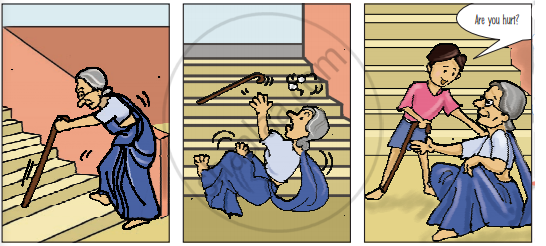Advertisements
Advertisements
प्रश्न
Briefly comment on:
The author’s meeting with Norbu.
उत्तर
The author had almost lost hope and felt absolutely helpless as the town seemed so mundane with no pilgrims or visitors, despite it was the season of Kora. Only the locals were busy carrying their daily activities of playing pool or ladies washing their head in the icy water. It was all very disappointing for the author. Besides, now that Tsetan had also left, he wondered how will he be able to communicate with anyone in English. He was not prepared to complete the Kora on his own. He did not even know if the snow is cleared and had no body to answer him this simple question. The author was sitting in the café when a man walks up to him. Recognising the language in the book he is reading, he asks the author if he was English. The author reckoned that the man was not from the region as he wore a windcheater and metal-rimmed spectacles of a western style. The man told his name was Norbu and he worked in Beijing at the Chinese Academy of Social Sciences, in the Institute of Ethnic Literature. He as well had come to do the Kora. He had been writing academic papers about the Kailash Kora and its importance in various works of Buddhist literature for many years. They both were equally ill-equipped and were ideal companions for the expedition.
APPEARS IN
संबंधित प्रश्न
Read the extract given below and answer the questions that follow:
Wear skins peeped through by bones and spectacles of steel
With mended glass, life bottle bits on stones.
(b) Explain: 'slag heap'.
(c) What future awaits these children?
(d) Name the figure of speech used in the third line.
How did the author feel about her mother's passion to make her a dancer?
Read the extract and state whether the following statement is true or false. Correct the false statement.
The author wanted to grow the desi variety of rice.
Using a dictionary/internet note down the main difference between farm and granary.
Pick out some sentences from the lesson that convey a general truth.
The tone of the poet is sarcastic. When he writes ‘All spaces are gridded filled with permutations of possibilities’ he intends to indicate the efforts made by the planner to exploit every available piece of land without any consideration of harming nature or violating attachments of people to places. Make pairs/groups and find out some more sarcastic lines having the same effect.
Choose the odd one out :
Bottom, Moth, Mustardseed, Cobweb.
Explain the following statement with reference to the context.
And then, once the ring's broken, we'll get to work and show the public every day just how incompetent the Mayor is!
Present any one of the speeches given above.
How did the students prepare for their stalls/presentations?
Read the following sentence aloud. Write who said it and to whom.
“Why, the dress you go to the theatre in !”
Think and answer:
Are the boys and girls happy that it is raining?
Think and answer:
Does the last line make you happy or sad? Why?
Using your imagination, write how the other pets in the house could have objected to Caesar living in their house.
Often the brook speaks of itself as if it is human.
For example, 'I bicker down a valley.'
Find two other examples of the human activities of the brook.
Who is a ‘netizen’?
And whether their station be high or humble,…
Pick out the alliteration from the above line.
What do you infer about speaking with others from this poem?
Give an example for dazzling light.
Why did the girls snigger?
Describe Gulliver’s encounter with the army of Blefuscu.
Work in pair, find answer for the question and share in the class.
Why does the poet say the ‘ Spring is pretty’?
How do we keep our integrity?
Which place was the last stand of the Indian army?
Did Tabaqui receive a warm welcome from the pack of wolves? How do you know?
The pigeon flew away for dry twigs.
What did the five friends call themselves?
Choose the correct one.
Rooster

What would you have done if your grandmother would have slipped?

Circle the words where you get a zzzzz sound. One is done for you.
| honeybees | |||
| price | prize | maze | face |
| rice | rise | blaze | fizz |
| lazy | lacy | busy | racy |
| raise | rays | race | ace |
| chase | this | these | frosty |
